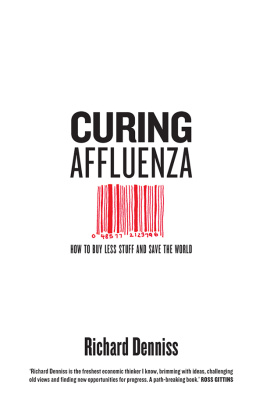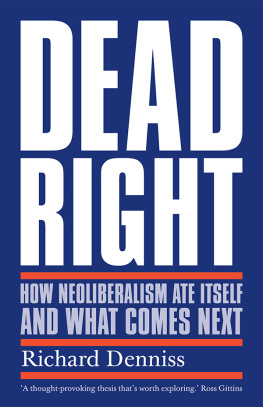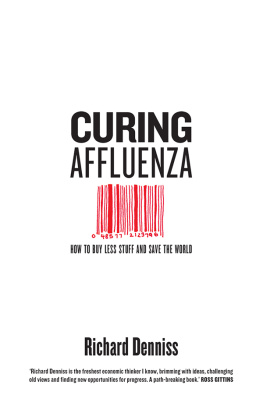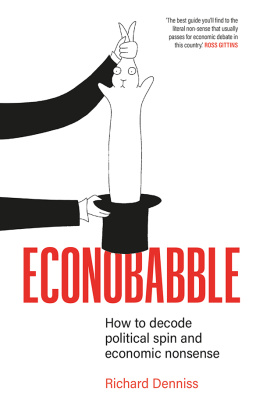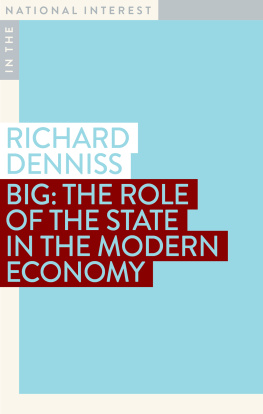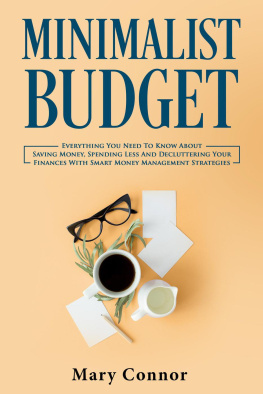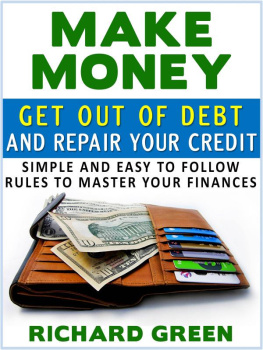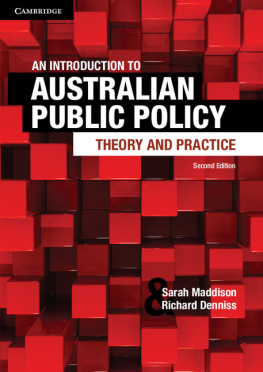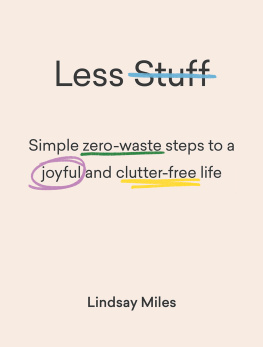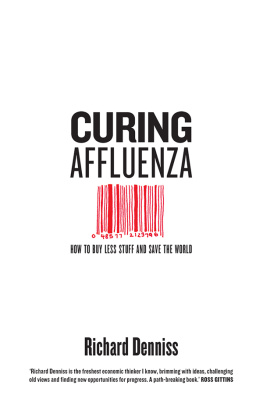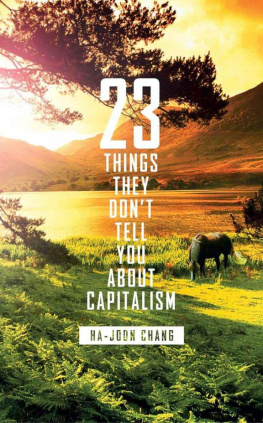Published by Black Inc.,
an imprint of Schwartz Publishing Pty Ltd
Level 1, 221 Drummond Street
Carlton VIC 3053, Australia
www.blackincbooks.com
Copyright Richard Denniss 2017
Richard Denniss asserts his right to be known as the author of this work.
ALL RIGHTS RESERVED.
No part of this publication may be reproduced, stored in a retrieval system, or transmitted in any form by any means electronic, mechanical, photocopying, recording or otherwise without the prior consent of the publishers.
National Library of Australia Cataloguing-in-Publication entry:
Denniss, Richard, author.
Curing affluenza: how to buy less stuff and save the world/Richard Denniss.
9781863959414 (paperback)
9781925435771 (ebook)
Consumption (Economics) Moral and ethical aspects.
Quality of life.
Materialism Psychological aspects.
Consumer behavior.
Cover and text design by Tristan Main
Preface
M y father remembers folding up the brown-paper bag that had contained his school lunch. There was no reason he couldnt use it again the next day. So he did. To this day my parents kitchen drawer contains a ball of rubber bands that found their way into the house, often wrapped around junk mail. Why would you throw perfectly good rubber bands away? ask my parents.
I throw perfectly good rubber bands away. I resent the people who ignore my requests for no junk mail to be left at my house, but I dont stockpile the rubber bands they give me. I grew up in a house where we were never short of rubber bands. My parents didnt. Culture shapes behaviour.
Just as a fish cant taste the water it swims in, it is hard for citizens in affluent societies to notice just how weird their culture has become. Culture tells us when it is time to swap the clothes we have for some new ones, to swap our car for a new one, and even when to rip out a perfectly functional kitchen and replace it with a modern one. It is cultural preference, rather than the price of seed, that has made lawn the largest irrigated crop in the US, and it is culture that tells us its more convenient to drive to the shops to buy vegetables than to plant them in the land taken up by our lawns.
Our culture also encourages us to throw away perfectly useful things, made of scarce natural resources, to send the signal that we arent stingy, mean or, worst of all, poor. Each year the citizens of rich countries throw away mountains of perfectly edible food, perfectly wearable clothes and fitness equipment that has never been used. Yet many of those doing the wasting feel poor, and many believe that if they throw the things they buy in the recycling bin, or leave them with a charity, their waste is actually a form of generosity.
We have built a culture where buying things is increasingly unrelated to using things. And we have built a culture where things are thrown away not because they are broken, but because they send the wrong signal about who we are. We use material things for primarily symbolic reasons, which means we throw them out not when they are broken, but when we need to send a new signal. In turn we have built the most materially wealthy communities the world has ever known, but despite this abundance of stuff, our culture makes people feel that they never have enough, or the right, stuff.
Our culture is suffering from a bad case of affluenza. Despite the incredible increase in material production and consumption over the past century, many of the richest people in the richest countries feel poor. But it neednt be this way. This culture that impoverishes us is a new one. It wasnt the norm when my dad was at school. By the time I was at school things were changing, and I think they have accelerated rapidly in recent years.
So if affluenza hasnt always been with us, and isnt uniformly spread across all countries, then obviously we can reduce or even eradicate it if we want to. And that is, of course, the big question: do we want to?
All rich cultures must grapple with what to do with their affluence. Egyptians once built great pyramids, Chinese once built a Great Wall, and in the 1960s and 1970s Americans built a vast nuclear weapons capacity. If we stopped dedicating so much time and so many natural resources to building mountains of wasted stuff, we could do anything we wanted. Of course we couldnt do everything we wanted we would have to make choices. But instead of being encouraged to question our national goals and make those choices, we are told that the market holds all the answers.
This book argues that markets can no more tell us where to head than a compass can tell a sailor where to sail. Markets are a means towards some ends, but they are silent about the ends that a democratic society should pursue.
This book also argues that, far from encouraging efficiency, markets have become the major driver of waste and inefficiency in developed countries. If we do away with the need to produce mountains of wasted resources, it will be simple to change our society in ways that will reduce the harm we do to the natural environment, improve our quality of life, create more jobs with more meaning and, most of all, give us more time to spend with the people, and on the things, we love the most.
Put simply, curing affluenza means that we will waste far less time and far fewer resources, and in turn make far more of the things we really want more of.
How, then, do we cure affluenza? I dont have all the answers. I dont know what the world will look like in ten years time, or a hundred. But I do know what I want to see more of and what I want to see less of.
The purpose of this book is to help widen our range of options and, I hope, make people more confident in demanding the changes they want. Most of the following chapters contain case studies, written by diverse authors, that show how individuals and communities have called for, and delivered, change: in their community, in their country and across the globe. The purpose of these case studies is to highlight that change doesnt just happen and isnt only driven by the market. People and communities demand and drive change all the time. There are alternatives, and the more people demand them, the faster change will occur.
The sooner we set out to build new alternatives, the quicker the idea that wasting stuff makes the economy strong will seem as ridiculous as the idea that sacrificing goats or virgins is a good way to improve a harvest.
We dont just need to reframe the debate or reform our policies. We need to fundamentally reshape the economy. History says its been done before, and voters around the world clearly believe that it is time we did it again.
Diagnosing the Disease
A ffluenza is that strange desire we feel to spend money we dont have to buy things we dont need to impress people we dont know.
Affluenza has not only transformed the size of our shopping malls and the contents of our garbage dumps, it has also transformed our culture, environment and economy. And despite the large wealth gap between developed and developing countries, this disease of affluence is trickling down to less well-off countries far more rapidly than the affluence itself. And nothing keeps people poorer than a bad case of affluenza.
Can affluenza be stopped? Like all pandemics, it is easily spread and mutates frequently, so it will be hard to cure. But hard doesnt mean impossible. Surely curing affluenza cant be as hard as wiping out polio with worldwide vaccination, or landing a man on the moon in a rocket that took a decade to build?
But just say we did abandon the idea that wasting resources is good for the economy. Wouldnt the global economic system grind to a halt? Put another way, isnt speeding up the rate at which middle-class people throw away perfectly functional furniture and appliances a good way to create jobs and reduce world poverty?

